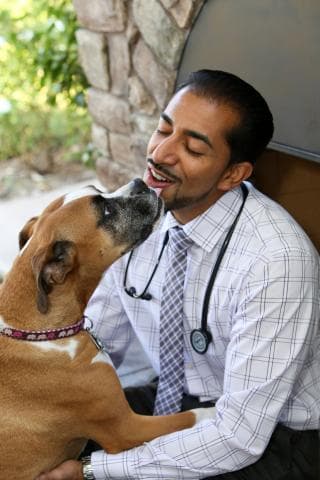Dog Senior Care Advice from Veterinarians
Any veterinarian will tell you that aging in and of itself is not a disease. That’s why it’s important to note any changes in your dog’s behavior and health as they age and not simply dismiss these changes as them getting older. You’ve already turned to the internet for answers on how to care for your senior dog, so you’re obviously a conscientious pet owner.
At GeniusVets, we believe that pet care information should come from veterinarians and not from the internet, as many well-meaning but ill-informed pet parents can spread misinformation. That’s why we’ve taken FAQs on caring for senior dogs, sent these questions to renowned veterinarians across the U.S., and compiled their replies to get you useful information that you can trust.
While we've sourced all of the senior dog care information and recommendations below directly from leading veterinarians across the country, please make sure to seek out the advice of your own veterinarian or find a trusted vet near you using the GeniusVets Directory.
What is the most important thing to know about taking care of my senior dog?
One of the most important things to know is that senior dogs need special attention and care because they are older. And just as in humans, as pets age, they are more prone to certain diseases and other issues. Pet parents must realize that there is a difference between senior dogs versus younger to middle-aged dogs. Catching any kind of problem earlier in their lives is going to be much more beneficial to us as veterinarians. Veterinarians prefer to treat any issues immediately as opposed to seldom seeing a dog and by the time they come in to see us, they have an advanced illness already. Recognizing and addressing those differences is the key to senior care.
Also, senior dogs still need mental and physical stimulation, as much as they might not seem to want that walk, hike, or interactive puzzle! Their brains still need those challenges and their bodies need activity as much or more than when they were young pups. You should also bring them to the vet more often to help them stay healthy and prolong their vitality.
What is the life expectancy of a dog?
Most veterinarians will tell you that the average dog lives anywhere from 13 to 15 years old. This is also a very broad question, however, because it depends on the breed and the size of the dog. In general, the smaller the dog, the longer the lifespan, the larger the dog, the shorter the lifespan. 15 to 16 years is old for our smaller dogs such as Chihuahuas and Yorkies, whereas 9, 10, or 11 is senior for our giant or large breed dogs such as Mastiffs, Great Danes, or St. Bernards.
How does getting older impact the health of my dog?
As mentioned, old age itself is not a disease but just as in humans, it’s going to take your dog a little longer to recover from certain injuries or problems that they experience as they age. Also just as with humans, dogs’ nutritional needs change as they get older. There are plenty of differences between the way dogs and humans age as well, with the biggest one being the fact that dogs are very stoic about illnesses. In fact, they’ll suffer in silence until the problem has advanced. Older dogs will often experience arthritis, eye conditions such as cataracts or nuclear sclerosis, and benign or malignant skin growths. All of these are reasons why you should have your senior dog seen by a veterinarian more than once or twice per year, as catching these things early will help your dog to avoid pain and hopefully help their prognosis.
As dogs age, there may be some things that you need to do as the pet owner to accommodate them and keep them happy. This might include some changes around the house because they're developing some arthritis, so you might consider putting their bed downstairs if they’ve been sleeping upstairs. Perhaps they can't walk as far as they used to go so, while you don’t want to give up their walks altogether, you might consider taking them for more walks at shorter distances.
How can wellness care extend the life and the comfort of my dog?
Regular wellness checkups include a thorough physical exam that would also include blood work and testing that can pick up on diseases before they’ve progressed. And anything that we can detect early before your pet becomes symptomatic usually carries a much better prognosis. Wellness will help extend your pet's life because you're being proactive and preventative rather than reactive. Your vet will make sure their blood work looks good, that they’re not detecting any early kidney disease, and they give urine tests to ensure we don’t see any stones or underlying infections in the bladder. They’ll often give their heart a listen.
There are things that you can do to help with your dog’s wellness as they age, too. Giving them well-balanced meals will help meet their nutritional needs and could even slow down arthritis that can occur in a lot of pets, reducing the need for medications. Regular dental cleaning and dental exams will help clean the tartar and plaque and remove the bacteria that can get into the bloodstream and affect the liver, kidney, and heart. Far too many senior dog parents overlook dental care or don't think it's necessary, but that's a big step in wellness and vitality in the dog.
A dog with kidney issues is a good example of how wellness care can extend the life of a pet. If an eight to nine-year-old dog goes to the vet and they do a blood panel and it comes back showing that their kidney numbers are elevated, the vet can recommend diet changes and provide supplements that improve the kidney function. On the other hand, if the veterinarian sees those results for a dog at 12 years old and the dog is in full-blown kidney failure, options are extremely limited.
What are the most common health problems in senior dogs?
Going back to the breeds, arthritis and joint disease are significant issues veterinarians often see in giant or large breed dogs. On the other hand, dental disease is a big one that they see in smaller dogs. Of course, both of those can occur in large and small breed dogs, and they’re the two most common issues that they see in senior dogs.
The other issues veterinarians see a lot in senior dogs are arthritis and weight gain. These two things go hand in hand because these dogs are moving less, but people are feeding them just as much. And they tend to gain weight, which makes it worse on the joints, so it’s like a snowball rolling downhill.
Other health issues veterinarians see in as dogs as they get older are:
- Kidney issues
- Heart disease
- Vision loss
- Cataracts
Does my senior dog still need their annual wellness exams or semi-annuals, vaccines, and preventive care?
Yes, absolutely. In fact, many veterinarians would tell you that these things are much more important as a dog ages. Considering how fast dogs age and how stoic they are, it’s all the more essential to stay on top of their health. Why? Dogs are pack animals by nature. Dogs are somewhat instinctually programmed to not show pain, and usually, by the time they do show you something, it's already pretty advanced and they can't compensate for it anymore. That's why it's very important to continue taking them in for examinations and perhaps do that even more frequently than you had in their younger years.
As they become senior pets, your vet will recommend that dogs continue certain vaccines based on their lifestyle and risks. As their bodies age, they are more susceptible to certain diseases, so you and your vet will want to keep them well-protected. And the more we can prevent, the fewer senior dog conditions your vet will have to treat.
Does my dog still need regular wellness exams as they get older?
Yes. After the age of seven, those in the veterinary industry usually consider dogs to be seniors. Dogs should get bi-annual wellness exams as they get older, but it's more important as they age and become seniors because six months to them can equate to two to three years, and sometimes even longer based on their life expectancy.
What are some signs and symptoms that my dog might be slowing down? You might start to notice they don't want to play as much, they’re not eating as much, or they’re dropping food out of their mouth. An aging dog is often slow to get up, especially in those winter months, and that can indicate some arthritis. Arthritis is very common in senior dogs, and it manifests in many ways. In a dog that used to bounce all over the place, run, jump fences, jump on and off of furniture, bed, stairs, etc, they’re now perhaps foregoing those stairs and the opportunity to jump on furniture. Dogs with arthritis are often very stiff after taking naps, and older dogs sleep a lot. When they go to get up, they could struggle due to the discomfort of arthritis.
Any change in your senior dog’s behavior is noteworthy. Perhaps your dog usually greets you at the door when you come in from work, and now they are looking up and wagging their tail, but they're staying where they are now. That could mean that they're arthritic, uncomfortable, or sore.
Another thing to watch out for in older dogs is heart conditions. What you might think is an inconsequential cough could be the beginnings of congestive heart failure. If you bring them in, your veterinarian might hear a heart murmur or fluid in the lungs. They will then do an x-ray, diagnose it, get them on meds, and the dog will hopefully get better. Again, be mindful of those seemingly subtle changes and if you see something that just doesn't look right or maybe the dog's doing something that you never did before, it's probably worth getting them looked at just to be safe. Don’t simply chalk these things up to old age, as there are often things we can do to improve these conditions.
Why is it important to avoid self-diagnosing whether my dog is slowing down or whether they’re sick?
By self-diagnosing or Google diagnosing, you might get the wrong diagnosis. It's vital to take the whole pet's health into account. By doing a thorough physical exam, we can check those things and get them on an appropriate exercise regimen or medications needed to help with their condition.
Remember, dogs can’t tell us they’re sick or where something hurts. Veterinarians are trained to help communicate what they're demonstrating to us and what we find on the physical exam to the clients. You might notice very subtle changes, but we can detect things that are more critical in regards to their health, whether they are actually sick or not.
Vomiting is the perfect example of something that can be misdiagnosed at home. Vomiting could indicate that they've found something dead in the yard, perhaps they found a piece of food that they weren't supposed to eat, or maybe they overate. It could be any or all of these basic and relatively benign things. But you know what? Vomiting could also be the first sign of kidney disease, liver disease, or that perhaps a toxin is presenting that way.
If you try to diagnose a condition at home and chalk up a change in your dog’s behavior as nothing, you run the risk that your vet could have treated a condition much earlier and cured that condition. If you don't address it quickly enough or the initial diagnosis is wrong, then it could have a less than desirable outcome. As an example, arthritis is a condition that can be treated with medication you can get from your veterinarian. And you want to get them on the right medication as soon as possible, as it can slow the progression.
What will my veterinarian be looking for when examining my senior dog?
Veterinarians do thorough nose-to-tail exams. They start with the face and look at their teeth. Does the dog have any dental disease? Are their eyes starting to get any cataracts or nuclear sclerosis, which is like a greyness of the eyes? How's their hearing? Do they have any underlying ear infections? Are there any reactive lymph nodes or enlargement of lymph nodes? They continue down the body and check their heart and lungs, and listen for heart murmurs or difficulty breathing. They also feel their belly for any abnormal tumors, move their joints to see if they have any pain and see if they can isolate any arthritis.
On top of a physical exam, your vet will also recommend testing that will tell us how they're doing internally. Blood tests, urine tests, fecal testing, blood pressure tests, eye pressure (to check for glaucoma) tests, and x-rays are all part of a good senior workup. Some dogs can have dry eyes so they may give them a tear test as well.
If I want to adopt a senior dog, what kind of things do I need to know?
Know that a senior dog could be at higher risk for certain diseases or problems, but they might not be. Just because they are a senior dog doesn't mean they have any issues or problems, but you need to know that there could be a bit more care involved. Your senior dog may need more attention than a younger dog. If you're adopting, you don't know their history, so you might want to try to find out if they're not used to being alone or if they could be prone to separation issues. And if you can get a medical history on them, that would be great, but many times our rescues or shelter adoptions don't have the privilege of having those records. That’s why the initial physical exam by a veterinarian and some routine lab work is so critical. Do they have heartworm disease? Are their organs functioning well? Does their heart sound good? And then, of course, your vet will look at their weight and all those things that would help to determine their quality of life.
The AVMA is also an excellent resource for caring for aging pets. If you have any further questions about how to best care for your senior dog, please reach out to your vet. Don’t have one? We can help you find a local veterinarian!





